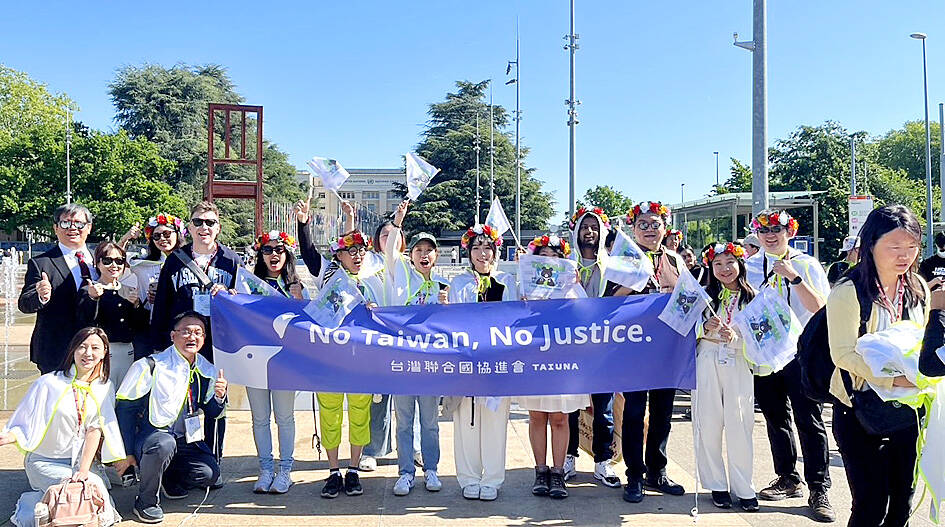International society should support Taiwan’s participation in the WHO and other international healthcare organizations in line with the principles of fairness and professionalism, Minister of Health and Welfare Chiu Tai-yuan (邱泰源) said in Geneva on Saturday.
The annual World Health Assembly (WHA) — the decisionmaking body of the WHO — is to begin today in Genva, Switzerland. As of yesterday, Taiwan had yet to receive an invitation.
The Taiwan WHA Action Team led by Chiu, which includes health officials and legislators, attended the opening ceremony of the “Taiwan’s Tech for WHO’s Three Core Pillars” interactive exhibition on Saturday. The event, hosted by the civil group Taiwan United Nations Alliance (TAIUNA) in the lobby of Geneva Cornavin train station, is to run until this afternoon.

Photo courtesy of Lee Yan-hui
The ceremony opened with the Puzangalan Children’s Choir, made up of children from the indigenous Paiwan community, singing renowned Taiwanese folk songs.
The exhibition, a collaboration of many Taiwanese start-up teams, showcases healthcare technologies, including a chronic diseases information management system for large language models, a blockchain-based health credential platform and a fall detection system, TAIUNA said.
Exhibition curator and TAIUNA member Tung Nai-Yun (董乃昀) said the main topic of the exhibition is the WHO’s “Triple Billion” goals — “more people benefiting from universal health coverage,” “more people better protected from health emergencies” and “more people enjoying better health and well-being.”
During the COVID-19 pandemic, Taiwan demonstrated its technology governance and public health capabilities, so hopefully the exhibition can show the world how it can use technology to improve global health, she said.
The National Health Insurance system has shown its systemic resilience, allowing flexible responses and civilian mobilization, which is the implementation of the WHO’s goal of “more people benefiting from universal health coverage,” Chiu said.
Taiwan used digital technology to assist in border controls, vaccine distribution and medical resource allocation, which prevented its health system from being overwhelmed, he said.
“The international society should support Taiwan’s participation in the WHO and other international healthcare organizations, according to the principles of fairness and professionalism,” he said.
“Only when all who are capable of contributing are allowed to participate, can global health truly become sustainable,” he added.
TAIUNA executive director and New Taipei City Councilor Evalyn Chen (陳乃瑜) said that regardless of race and nationality, health is a common responsibility of the whole world, and Taiwan has long shown it has the medical capability to be a WHO member, so it would continue to communicate with the international community.
“Taiwan is not only a participant, but can be a contributor,” she said.

The Coast Guard Administration (CGA) yesterday said it had deployed patrol vessels to expel a China Coast Guard ship and a Chinese fishing boat near Pratas Island (Dongsha Island, 東沙群島) in the South China Sea. The China Coast Guard vessel was 28 nautical miles (52km) northeast of Pratas at 6:15am on Thursday, approaching the island’s restricted waters, which extend 24 nautical miles from its shoreline, the CGA’s Dongsha-Nansha Branch said in a statement. The Tainan, a 2,000-tonne cutter, was deployed by the CGA to shadow the Chinese ship, which left the area at 2:39pm on Friday, the statement said. At 6:31pm on Friday,

The Chinese People’s Liberation Army Navy’s (PLAN) third aircraft carrier, the Fujian, would pose a steep challenge to Taiwan’s ability to defend itself against a full-scale invasion, a defense expert said yesterday. Institute of National Defense and Security Research analyst Chieh Chung (揭仲) made the comment hours after the PLAN confirmed the carrier recently passed through the Taiwan Strait to conduct “scientific research tests and training missions” in the South China Sea. China has two carriers in operation — the Liaoning and the Shandong — with the Fujian undergoing sea trials. Although the PLAN needs time to train the Fujian’s air wing and

The American Institute in Taiwan (AIT) put Taiwan in danger, Ma Ying-jeou Foundation director Hsiao Hsu-tsen (蕭旭岑) said yesterday, hours after the de facto US embassy said that Beijing had misinterpreted World War II-era documents to isolate Taiwan. The AIT’s comments harmed the Republic of China’s (ROC) national interests and contradicted a part of the “six assurances” stipulating that the US would not change its official position on Taiwan’s sovereignty, Hsiao said. The “six assurances,” which were given by then-US president Ronald Reagan to Taiwan in 1982, say that Washington would not set a date for ending arm sales to Taiwan, consult

A Taiwanese academic yesterday said that Chinese Ambassador to Denmark Wang Xuefeng (王雪峰) disrespected Denmark and Japan when he earlier this year allegedly asked Japan’s embassy to make Taiwan’s representatives leave an event in Copenhagen. The Danish-language Berlingske on Sunday reported the incident in an article with the headline “The emperor’s birthday ended in drama in Copenhagen: More conflict may be on the way between Denmark and China.” It said that on Feb. 26, the Japanese embassy in Denmark held an event for Japanese Emperor Naruhito’s birthday, with about 200 guests in attendance, including representatives from Taiwan. After addressing the Japanese hosts, Wang